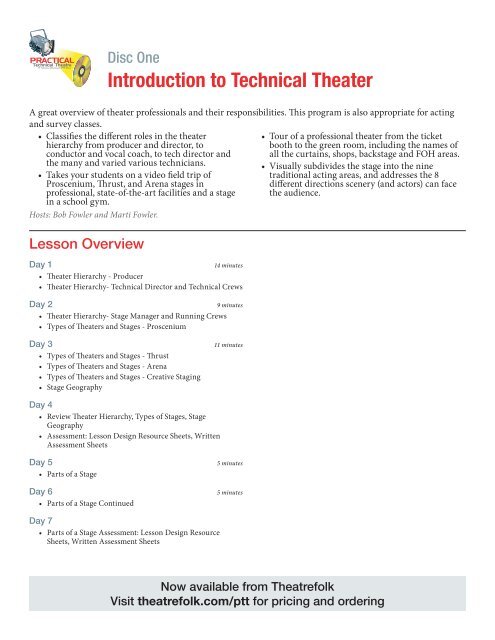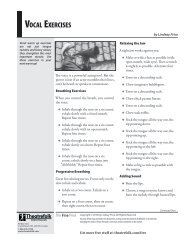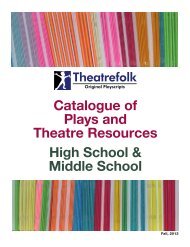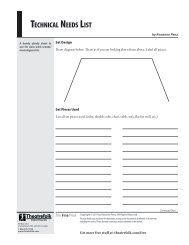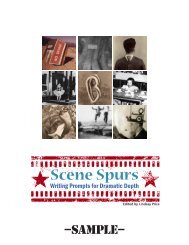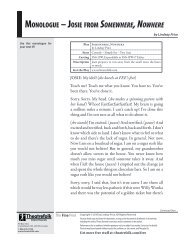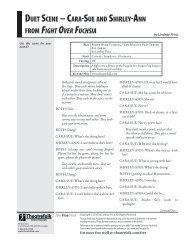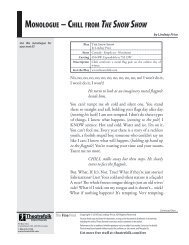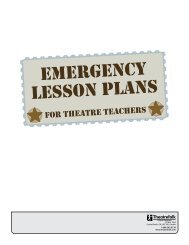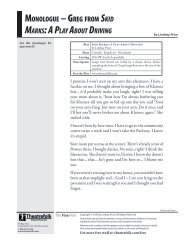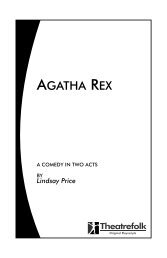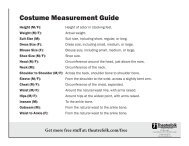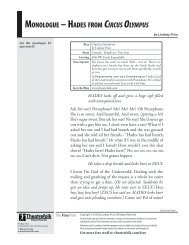Download a Set of Detailed Course Outlines - Theatrefolk
Download a Set of Detailed Course Outlines - Theatrefolk
Download a Set of Detailed Course Outlines - Theatrefolk
You also want an ePaper? Increase the reach of your titles
YUMPU automatically turns print PDFs into web optimized ePapers that Google loves.
Disc One<br />
Introduction to Technical Theater<br />
A great overview <strong>of</strong> theater pr<strong>of</strong>essionals and their responsibilities. This program is also appropriate for acting<br />
and survey classes.<br />
• Classifies the different roles in the theater<br />
• Tour <strong>of</strong> a pr<strong>of</strong>essional theater from the ticket<br />
hierarchy from producer and director, to<br />
booth to the green room, including the names <strong>of</strong><br />
conductor and vocal coach, to tech director and all the curtains, shops, backstage and FOH areas.<br />
the many and varied various technicians.<br />
• Visually subdivides the stage into the nine<br />
• Takes your students on a video field trip <strong>of</strong><br />
traditional acting areas, and addresses the 8<br />
Proscenium, Thrust, and Arena stages in<br />
different directions scenery (and actors) can face<br />
pr<strong>of</strong>essional, state-<strong>of</strong>-the-art facilities and a stage the audience.<br />
in a school gym.<br />
Hosts: Bob Fowler and Marti Fowler.<br />
Lesson Overview<br />
Day 1<br />
14 minutes<br />
• Theater Hierarchy - Producer<br />
• Theater Hierarchy- Technical Director and Technical Crews<br />
Day 2<br />
• Theater Hierarchy- Stage Manager and Running Crews<br />
• Types <strong>of</strong> Theaters and Stages - Proscenium<br />
9 minutes<br />
Day 3<br />
• Types <strong>of</strong> Theaters and Stages - Thrust<br />
• Types <strong>of</strong> Theaters and Stages - Arena<br />
• Types <strong>of</strong> Theaters and Stages - Creative Staging<br />
• Stage Geography<br />
11 minutes<br />
Day 4<br />
• Review Theater Hierarchy, Types <strong>of</strong> Stages, Stage<br />
Geography<br />
• Assessment: Lesson Design Resource Sheets, Written<br />
Assessment Sheets<br />
Day 5<br />
• Parts <strong>of</strong> a Stage<br />
Day 6<br />
• Parts <strong>of</strong> a Stage Continued<br />
5 minutes<br />
5 minutes<br />
Day 7<br />
• Parts <strong>of</strong> a Stage Assessment: Lesson Design Resource<br />
Sheets, Written Assessment Sheets<br />
Now available from <strong>Theatrefolk</strong><br />
Visit theatrefolk.com/ptt for pricing and ordering
Disc Two<br />
Basic <strong>Set</strong> Construction & Theater Safety<br />
• Demonstrates how to become a safe and efficient<br />
stage carpenter.<br />
• Identifies basic safety rules that apply to any<br />
theater, including the three basic tool safety<br />
categories (measuring and marking, cutting and<br />
shaping, and joining tools), construction, and<br />
finally set strike.<br />
Hosts: Bob Fowler and Marti Fowler.<br />
• Tours a completed interior set, then takes students<br />
back to the shop for sections on constructing<br />
practical set pieces (platforms, stair units and<br />
wagons) flat construction (including joining<br />
techniques like hinges, lash lines, battens/keeper<br />
hooks) and how to dutchman.<br />
• Explores options for dressing out a set with props.<br />
Lesson Overview<br />
Day 1<br />
• General Theater Safety Resource Sheet<br />
• Measuring and Marking Tools Safety Resource Sheet<br />
9 minutes<br />
Day 2<br />
• Measuring and Marking Tools-Safety Written Assessment<br />
Day 3<br />
• Cutting-Joining Tools Resource Sheet<br />
Day 4<br />
• Materials Resource Sheet<br />
• Fasteners Resource Sheet<br />
Day 5<br />
• Cutting-Joining-Materials Written Assessment<br />
Day 6<br />
• <strong>Set</strong>-Housing Differences Resource Sheet<br />
• Platforms Resource Sheet<br />
6 minutes<br />
6 minutes<br />
6 minutes<br />
Day 11 Part One<br />
• Flats Construction Test<br />
Day 11 Part Two<br />
• Covering, Joining, Dutching Flats Resource Sheet<br />
Day 12<br />
• Review for Written Assessment<br />
Day 13<br />
• Covering, Joining, Dutching Flats Written Assessment<br />
Day 14<br />
• Strike Safety Resource Sheet<br />
Day 15<br />
• Strike Safety Written Assessment<br />
10 minutes<br />
3 minutes<br />
Day 7<br />
• Legging Platforms Resource Sheet<br />
• Wagons Resource Sheet<br />
Day 8<br />
• Stairs Resource Sheet<br />
5 minutes<br />
5 minutes<br />
Day 9<br />
• Practical Units <strong>of</strong> Scenery Written Assessment<br />
Day 10<br />
• Flats Resource Sheet<br />
11 minutes<br />
Now available from <strong>Theatrefolk</strong><br />
Visit theatrefolk.com/ptt for pricing and ordering
This hands-on primer will produce results on your stage by giving your students the skills required to light a<br />
stage evenly, establish basic moods, create some basic special effects, and troubleshoot many common problems.<br />
• Walks students through a step-by-step process • Differentiates the creative uses <strong>of</strong> various lighting<br />
for lighting a show, from designing and executing instruments and control equipment.<br />
a basic light plot, hanging, circuiting, patching,<br />
subbing and cueing.<br />
Hosts: Bob Fowler and Marti Fowler.<br />
Lesson Overview<br />
Disc Three<br />
Lighting for Theater<br />
Day 1<br />
• Reasons for Using Stage Lighting<br />
• 3 Controllable Qualities <strong>of</strong> Light – Intensity<br />
Day 2<br />
• 3 Controllable Qualities <strong>of</strong> Light – Color<br />
• 3 Controllable Qualities <strong>of</strong> Light – Distribution<br />
Day 3<br />
• Types <strong>of</strong> Lighting Instruments<br />
• Lighting Positions<br />
• Review for Written Assessment<br />
15 minutes<br />
10 minutes<br />
20 minutes<br />
Day 4<br />
• Review for Written Assessment<br />
• Written Assessment<br />
Day 5<br />
• Basic Lighting Design<br />
• Doing a Hanging Plot<br />
Day 6<br />
• Patching Schedule<br />
• Cueing the Show<br />
• Hanging, Focusing, and Gelling your Show<br />
• Troubleshooting Common Problems<br />
15 minutes<br />
20 minutes<br />
Day 7<br />
• Review for Written Assessment<br />
• Written Assessment<br />
Day 8-9<br />
• Design a light plot for a one-act play (OPTIONAL)<br />
Now available from <strong>Theatrefolk</strong><br />
Visit theatrefolk.com/ptt for pricing and ordering
Bring an industry recognized audio expert into your classroom with this program.<br />
• Analyzes the components <strong>of</strong> a typical theater • Compares and contrasts different microphones<br />
sound system: microphones, mixing consoles,<br />
(wired and wireless) to understand how to choose<br />
signal processing, speakers and their placement, the right mic for different situations.<br />
intercom and stage announce systems, playback • Has great recommendations for troubleshooting<br />
systems for sound effects, and power sources.<br />
feedback, fuzzy signals, speakers cutting out, and<br />
other common problems.<br />
Host: Audio Engineer David Eisenhauer. Eisenhauer’s credits include live shows such as Bon Jovi, Sheryl Crow, Enrique<br />
Iglesias and John Mellencamp.<br />
Lesson Overview<br />
Disc Four<br />
Audio for Theater<br />
Day 1<br />
• Responsibilities <strong>of</strong> the sound crew<br />
• What is Sound?<br />
• Components <strong>of</strong> a sound system<br />
Day 2<br />
• Microphones<br />
• Dynamic vs Condenser<br />
• Pick-up Patterns<br />
• Types and Applications<br />
• Wireless Microphones<br />
24 minutes<br />
20 minutes<br />
Day 7<br />
• <strong>Set</strong>ting Up Your System<br />
Day 8<br />
• Helpful Hints and Troubleshooting<br />
Day 9<br />
• Written Assessment<br />
20 minutes<br />
18 minutes<br />
Day 3<br />
• Written Assessment<br />
Day 4<br />
• Front <strong>of</strong> House<br />
• Signal Levels<br />
• Mixers/Consoles and Mix Position<br />
• Recording/Playback Formats<br />
16 minutes<br />
Day 5<br />
• Amplifiers<br />
• Speakers, Cross-overs<br />
• Powered Speakers<br />
• Speaker Placement and Safety<br />
14 minutes<br />
Day 6<br />
• Signal Processing<br />
• Audio and Electricity<br />
• Intercom/Announce Systems<br />
• Cables and Connectors<br />
18 minutes<br />
Now available from <strong>Theatrefolk</strong><br />
Visit theatrefolk.com/ptt for pricing and ordering
Disc Five<br />
Stage Management Second Edition<br />
With hands-on demonstrations and real world tips, this program will have your students running shows like<br />
pr<strong>of</strong>essionals in no time!<br />
• A New Overview Section identifies what a stage • A New Communication Section addresses when<br />
manager does, from pre-show conferences to<br />
to use Electronic Media, Individual Notes, and<br />
closing night in Limited, Touring, and Extended when to communicate Face-to-Face.<br />
runs.<br />
• Focuses on Technical Rehearsals and<br />
• <strong>Detailed</strong> sections illustrate rehearsal skills like Performances, including Pre-Show Protocol,<br />
Taping the Stage, Making Prompt Books and<br />
how to actually Call a Show, and how to avoid,<br />
Calling Scripts, Using Blocking and Cueing<br />
prepare for, and, when necessary, handle Common<br />
Shorthand, Running Production Meetings, and Problems.<br />
other tricks <strong>of</strong> the trade.<br />
• More New Sections include: Maintaining a Show,<br />
Touring and Extended Runs, Stage Managing<br />
Musicals, and Careers in Stage Management<br />
Hosts: J. Jason Daunter, a New York based pr<strong>of</strong>essional stage manager. He is an Educational Theatre Association board<br />
member, and a driving force behind EdTA’s “Defying Gravity” initiative.<br />
Tom Martin, a pr<strong>of</strong>essional Director, Stage and Production Manager for 35 years.<br />
Lesson Overview<br />
Day 1<br />
• Pre-rehearsal responsibilities<br />
• Rehearsal responsibilities<br />
• Performance / maintenance responsibilities<br />
• Communication<br />
• Technology and Communication<br />
Day 2<br />
• Read for enjoyment, props and costume piece list<br />
• French Scene Breakdown<br />
• Read the Play For Technical Requirements<br />
• Documents, Supplies, and Things To Secure<br />
• Rehearsal props & Costume Pieces, Groundplan &<br />
drawings<br />
Day 3<br />
• Taping the Floor<br />
• Building the Book<br />
• Different ways to obtain materials<br />
• Physically build the book<br />
13 minutes<br />
18 minutes<br />
11 minutes<br />
• Idiosyncrasies <strong>of</strong> your particular theatre / First rehearsal<br />
• Production Meetings<br />
• Blocking notation<br />
Day 5<br />
• Presets<br />
• Daily notes / What goes on the daily notes<br />
• Relationship between the Director and Stage Manager<br />
• Relationship between the Director and The Actors<br />
• Making a sound plot<br />
• Making cue sheets and putting cues in the book<br />
• Technical rehearsals<br />
Day 6<br />
• Performance<br />
• Your check list<br />
• Calling the show<br />
• Maintaining the technical aspect and the actors<br />
• Performance reports<br />
• Emergencies<br />
29 minutes<br />
17 minutes<br />
Day 4<br />
• Arranging the Furniture for First Rehearsal<br />
• Talking to the Director<br />
• Talking to the actors about the first rehearsal<br />
15 minutes<br />
Day 7<br />
• Stage Managing / Maintaining a Long Run Show:<br />
• Touring a Show<br />
22 minutes<br />
Now available from <strong>Theatrefolk</strong><br />
Visit theatrefolk.com/ptt for pricing and ordering
This program illustrates how to maintain top-notch production values in facilities that range from the high<br />
school “cafetorium” to state-<strong>of</strong>-the-art theaters.<br />
• Explores various types <strong>of</strong> common interior and • Offers hands-on group projects such as<br />
exterior set design styles: Box <strong>Set</strong>s, Unit <strong>Set</strong>s, and researching for period plays, working with the<br />
Wing and Drop <strong>Set</strong>s, as well as combinations <strong>of</strong> director and other designers to achieve a specific<br />
those three types.<br />
style the production concept, and considering<br />
• Demonstrates how to analyze a script to<br />
directional compositions in the design.<br />
determine technical demands.<br />
• Analyzes common aspects <strong>of</strong> set design including<br />
sightlines, furniture placement and traffic<br />
patterns, and basic scale drawing.<br />
Hosts: Bob Fowler and Marti Fowler.<br />
Lesson Overview<br />
Disc Six<br />
<strong>Set</strong> Design<br />
Day 1<br />
• Introduction to <strong>Set</strong> Design<br />
• Tour <strong>of</strong> a Typical Theater<br />
• Script Analysis (part 1)<br />
Day 2<br />
• Script Analysis (parts 2&3)<br />
Day 3<br />
• Design Analysis and Styles<br />
• Differences between Actual Buildings and <strong>Set</strong>s<br />
12 minutes<br />
7 minutes<br />
26 minutes<br />
Day 14<br />
• Rear Elevations and Working Drawings<br />
• Exterior <strong>Set</strong>s and Unit <strong>Set</strong>s<br />
• Resumes and Portfolios<br />
• Review for Unit Test<br />
Day 15<br />
• Review and Written Assessment<br />
23 minutes<br />
Day 4<br />
• Tour <strong>of</strong> a Completed <strong>Set</strong><br />
• Scale Drawings<br />
23 minutes<br />
Day 5<br />
Preparing to Build Your Model <strong>Set</strong><br />
• Front Elevations and Model<br />
4 minutes<br />
Days 6-13<br />
Preparing to Build Your Model <strong>Set</strong> (continued)<br />
• Walls, Floors and Platforms<br />
• Furniture<br />
• Painting Your Model<br />
23 minutes<br />
Now available from <strong>Theatrefolk</strong><br />
Visit theatrefolk.com/ptt for pricing and ordering
This program is an extension <strong>of</strong>, and should be used after, Lighting For Theater. It explores advanced concepts<br />
<strong>of</strong> lighting design by investigating the process <strong>of</strong> designing and executing a complete light plot that incorporates<br />
many special effects.<br />
• Demonstrates how to analyze a script with<br />
“designer’s eyes,” and the collaborative process <strong>of</strong><br />
working with the director and other designers.<br />
• Compares and contrasts common representational<br />
and presentational production styles.<br />
Hosts: Bob Fowler and Marti Fowler.<br />
Lesson Overview<br />
Disc Seven<br />
Lighting Design<br />
Day 1<br />
• Introduction to Lighting Design<br />
• Reasons for Using Stage Lighting<br />
• General Qualities <strong>of</strong> Light: Transmission, Absorption,<br />
Reflection and Refraction<br />
21 minutes<br />
Day 2<br />
• Controllable Qualities <strong>of</strong> Light: Intensity and Distribution<br />
18 minutes<br />
• Analyzes color theory, angles <strong>of</strong> light and other<br />
design considerations.<br />
• Explores how to design a hanging plot, how to<br />
create instrument and patching schedules, and<br />
how to cue a show on both computerized and<br />
manual lighting controllers.<br />
Day 3<br />
• Color in Light<br />
Day 4<br />
• The Design Process<br />
11 minutes<br />
16 minutes<br />
Day 5<br />
• Lighting a Basic Box <strong>Set</strong><br />
• The Hanging Plot, Instrument Schedule, Cue Sheets<br />
25 minutes<br />
Day 6<br />
• Designing for a Larger Theater Space<br />
• Hanging Plot for Richard III<br />
• Patching and Cueing Richard III<br />
28 minutes<br />
Day 7<br />
• Review and Written Assessment<br />
Day 8-10<br />
• Lighting Design Project<br />
Now available from <strong>Theatrefolk</strong><br />
Visit theatrefolk.com/ptt for pricing and ordering
Enter the working world <strong>of</strong> the “business <strong>of</strong> show business” with this program. Develop a system to build patron<br />
loyalty, manage ticket sales, create budgets, and prepare for the unexpected.<br />
• Discover new ways to publicize your plays, fill the • Script written by Lana Hagan, faculty SIU<br />
seats in your theater, and make the program grow Edwardsville and EdTA Hall <strong>of</strong> Fame Member.<br />
within your school environment.<br />
Ms. Hagan has presented Business and House<br />
• <strong>Outlines</strong> the best strategies for managing ticket Management workshops at conferences across the<br />
distribution, preparing and printing programs, US.<br />
handling facility preparation and maintenance,<br />
training your staff in performance protocol, and<br />
handling emergencies.<br />
Hosts: Bob Fowler and Marti Fowler.<br />
Lesson Overview<br />
Disc Eight<br />
Business & House Management<br />
Day 1<br />
• Hierarchy and Marketing Plan<br />
• Involving Your School and Community<br />
Day 2<br />
• PSAs and News Releases<br />
• Posters<br />
• Fine Arts Booster Clubs<br />
• Patron Programs<br />
Day 3<br />
• Tickets – Producing and Selling Them<br />
Day 4<br />
• Programs<br />
Day 5<br />
• Production Budgets<br />
Day 6<br />
• House Manager/Staff Responsibilities<br />
• Building Your Program<br />
18 minutes<br />
18 minutes<br />
15 minutes<br />
12 minutes<br />
13 minutes<br />
14 minutes<br />
Day 7<br />
• Review and Written Assessment<br />
Now available from <strong>Theatrefolk</strong><br />
Visit theatrefolk.com/ptt for pricing and ordering
This program provides video and stills showing pr<strong>of</strong>essionals working in their specialized areas, including...<br />
• Performers, playwrights, composers, stagehands, • A second DVD that has interviews with working<br />
dressers, designers, scenics, FOH personnel,<br />
pr<strong>of</strong>essionals to help your students discover<br />
directors, choreographers, business management what a typical day at work is like, what the most<br />
personnel, TDs, production managers, crafts<br />
satisfying and challenging parts <strong>of</strong> their pr<strong>of</strong>ession<br />
personnel, stitchers, drapers, casting directors, are, what kind <strong>of</strong> training their job requires, what<br />
and more!<br />
their day to day lives are like, and which jobs<br />
• Different types <strong>of</strong> theatres (NY, Regional,<br />
demand irregular hours and travel.<br />
Touring).<br />
• How to get into the different theatrical unions,<br />
what the unions <strong>of</strong>fer, and careers in theatre<br />
education.<br />
Lesson Overview<br />
Disc Nine<br />
Careers in Theatre<br />
Day 1<br />
Employment Opportunities<br />
Examines 4 very different venues, from a 10,700 seat outdoor<br />
musical venue, to a large outdoor Shakespeare Festival, an<br />
Opera company that runs in true repertory, and finally more<br />
traditional Stock company.<br />
15 minutes<br />
Pr<strong>of</strong>essional Theatre – or who’s going to hire me?<br />
This section examines producing organizations, and common<br />
types <strong>of</strong> runs: Limited, Extended/Open-ended, Stock, and<br />
True Repertory.<br />
10 minutes<br />
Day 2<br />
15 minutes<br />
What are the differences between Commercial and Not-For-<br />
Pr<strong>of</strong>it Theatres?<br />
Day 3<br />
An overview <strong>of</strong> the most common theatrical unions, and<br />
some things to consider before joining one <strong>of</strong> them.<br />
Day 4<br />
Jobs in Theatre<br />
15 minutes<br />
Theatre Management: (e.g. company manager, house manager,<br />
box <strong>of</strong>fice manager, director <strong>of</strong> development, education<br />
director, director <strong>of</strong> marketing, etc.)<br />
9 minutes<br />
Pre-Show / Performance Staff: Artistic director, director,<br />
designers, casting director, theatrical agents, actors, stage<br />
manager, choreographer, dance captain, vocal coach, dialect<br />
coach, dramaturg, running crews, etc.<br />
9 minutes<br />
Day 5<br />
15 minutes<br />
Production Staff: production manager, technical director,<br />
carpenters, props, electricians, drapers, stitchers, trimmers,<br />
dressers, wardrobe supervisor, stage managers, audio techs,<br />
scenic artists, scenic charge, etc.<br />
Day 6<br />
Meet the owner <strong>of</strong> large production company, and learn about<br />
job opportunities in that facility.<br />
5 minutes<br />
Educational Theatre<br />
A look at Elementary and Secondary, Community College,<br />
and University theatre, their goals, job security, what degrees<br />
are available, and what degrees are needed. Educational arms<br />
<strong>of</strong> pr<strong>of</strong>essional companies are also examined. 12.5 minutes<br />
Day 7-8<br />
Interviews with Pr<strong>of</strong>essionals<br />
May be viewed individually.<br />
85 minutes total<br />
Actor (Actors Equity Association), Costumer (United Scenic<br />
Artists 829), <strong>Set</strong> Designer (United Scenic Artists 829),<br />
Stagehand (IATSE Local 6), Director/Choreographer (Society<br />
<strong>of</strong> Stage Directors and Choreographers), Dresser/Wig Specialist<br />
(IATSE), Production Supervisor (Repertory Theatre <strong>of</strong> St.<br />
Louis), Artistic Director (Repertory Theatre <strong>of</strong> St. Louis), and<br />
Executive Producer (Fox Theatricals).<br />
Day 9<br />
Written Assessment<br />
Now available from <strong>Theatrefolk</strong><br />
Visit theatrefolk.com/ptt for pricing and ordering
This program is written and hosted by Terry McGonigle, an EdTA Hall <strong>of</strong> Fame inductee. It is a two week unit<br />
that will help your students discover...<br />
• The Design Process, script and character analysis, • Moving from two to three dimensions, and how to<br />
research, the functions and elements <strong>of</strong> costume buy, build and rebuild costumes.<br />
design, and costume charts and plots.<br />
• Turning old into new by creating period clothing<br />
• Figure Drawing, even for people who are<br />
from modern pieces.<br />
convinced they cannot draw!<br />
• Accessorizing to complete the look.<br />
• Drawing Fabrics, including patterns, print,<br />
texture.<br />
Lesson Overview<br />
Disc Ten<br />
Costuming for Theatre<br />
Day 1<br />
Introduction and the Script<br />
8 minutes<br />
Section includes a short play to start script analysis, or you<br />
may choose to use a play you have available. Included is a<br />
short written assessment.<br />
Day 2<br />
Functions <strong>of</strong> Costume Design<br />
• Functions<br />
• Knowing the Characters<br />
• Research<br />
• How to do a Costume Chart<br />
Section includes several character analysis formats geared<br />
specifically towards costume design. Included is a short<br />
written assessment.<br />
7 minutes<br />
Day 7<br />
Applying Clothes to the Body<br />
7 minutes<br />
Section includes lots <strong>of</strong> replaying short sections, and pausing<br />
program as students draw on resource sheets.<br />
Day 8<br />
• Turning New into Old<br />
• Pr<strong>of</strong>essional Opportunities in Costuming<br />
• Review for Unit Written Assessment<br />
Day 9<br />
• Written Assessment<br />
7 minutes<br />
Day 3-4<br />
Elements <strong>of</strong> Costume Design, and Developing a Design<br />
Concept<br />
13.5 minutes<br />
Section includes several resource sheets addressing elements<br />
<strong>of</strong> design, and a short written assessment.<br />
Day 5-6<br />
7 minutes<br />
Drawing the Human Form (7.5 Heads Formula), Drawing<br />
the Basic Body (actual process done by students).<br />
Section includes lots <strong>of</strong> replaying short sections, and pausing<br />
program as students draw on resource sheets.<br />
Now available from <strong>Theatrefolk</strong><br />
Visit theatrefolk.com/ptt for pricing and ordering


